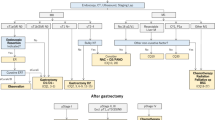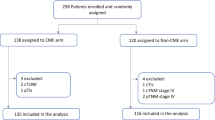Abstract
The concept of multidisciplinary team discussion of patient’s care has been a part of routine medical practice for several decades [Monson et al. in Bull Am Coll Surg 101:45–46, 2016; NHS. Improving outcomes in colorectal cancer—the manual. (Guidance on commissioning cancer services—improving outcomes). 1997.]. The idea of bringing multiple specialties and ancillary services together to help optimize patient outcomes has been implemented in several clinical arenas from burns to physical medicine and rehabilitation to oncology. In the oncology realm, multidisciplinary tumor boards (MDTs) originated as a broad-based meeting that would permit the review and discussion of cancer patients to optimize treatment strategies [Cancer Co. Optimal Resources for Cancer Care: 2020 Standards. Chicago, IL: 2019.]. Over time, as further specialization occurred and clinical treatment algorithms have become more complex, multidisciplinary tumor boards have become more disease site specific. In this article we will discuss the importance of MDTs, specifically focusing on rectal cancer MDTs including their impact on treatment planning as well as the unique interplay of clinical specialties that provide internal quality control and improvement. Additionally, we will discuss some of the potential benefits of MDTs beyond the direct impact on patient care and review some of the challenges of implementation.
Similar content being viewed by others
References
Monson JRT, Dietz DW, Boughey JC, You YN. Improving rectal cancer outcomes through advocacy, education, and research: The OSTRiCh Consortium and the new NAPRC. Bull Am Coll Surg. 2016 Nov;101(11):45-6. PubMed PMID: 28937195. Epub 2017/09/25.
NHS. Improving outcomes in colorectal cancer - the manual. (Guidance on commissioning cancer services - improving outcomes). 1997.
Cancer Co. Optimal Resources for Cancer Care: 2020 Standards. Chicago, IL: 2019.
Brar SS, Hong NL, Wright FC. Multidisciplinary cancer care: does it improve outcomes? J Surg Oncol. 2014 Oct;110(5):494-9. PubMed PMID: 24986235. Epub 2014/07/06.
Beets G, Sebag-Montefiore D, Andritsch E, et al. ECCO Essential Requirements for Quality Cancer Care: Colorectal Cancer. A critical review. Crit Rev Oncol Hematol. 2017 Feb;110:81-93. PubMed PMID: 28109408. Epub 2017/01/23.
Walraven JEW, van der Hel OL, van der Hoeven JJM, et al. Factors influencing the quality and functioning of oncological multidisciplinary team meetings: results of a systematic review. BMC Health Serv Res. 2022 Jun 27;22(1):829. PubMed PMID: 35761282. Pubmed Central PMCID: PMC9238082. Epub 2022/06/28.
Lamb BW, Sevdalis N, Arora S, et al. Teamwork and team decision-making at multidisciplinary cancer conferences: barriers, facilitators, and opportunities for improvement. World J Surg. 2011 Sep;35(9):1970-6. PubMed PMID: 21604049. Epub 2011/05/24.
Winters DA, Soukup T, Sevdalis N, et al. The cancer multidisciplinary team meeting: in need of change? History, challenges and future perspectives. BJU Int. 2021 Sep;128(3):271-9. PubMed PMID: 34028162. Epub 2021/05/25.
Wright FC, De Vito C, Langer B, et al. Multidisciplinary cancer conferences: a systematic review and development of practice standards. Eur J Cancer. 2007 Apr;43(6):1002-10. PubMed PMID: 17329094. Epub 2007/03/03.
Tanaka H, Medeiros G, Giglio A. Multidisciplinary teams: perceptions of professionals and oncological patients. Rev Assoc Med Bras (1992). 2020 Apr;66(4):419-23. PubMed PMID: 32578773. Epub 2020/06/25.
Sharma A, Sharp DM, Walker LG, Monson JR. Colorectal MDTs: the team's perspective. Colorectal Dis. 2008 Jan;10(1):63-8. PubMed PMID: 18078461. Epub 2007/12/15.
Fehervari M, Hamrang-Yousefi S, Fadel MG, et al. A systematic review of colorectal multidisciplinary team meetings: an international comparison. BJS Open. 2021 May 7;5(3). PubMed PMID: 34013317. Pubmed Central PMCID: PMC8134530. Epub 2021/05/21.
Stringfield SB, Fleshman JW. Specialization improves outcomes in rectal cancer surgery. Surg Oncol. 2021 37: 101568
Wilkinson N. Management of Rectal Cancer. Surg Clin North Am. 2020 Jun;100(3):615-28. PubMed PMID: 32402304. Epub 2020/05/14.
Surgical Oncology Manual. 2nd ed: Springer, 2016
Richardson B, Preskitt J, Lichliter W, et al. The effect of multidisciplinary teams for rectal cancer on delivery of care and patient outcome: has the use of multidisciplinary teams for rectal cancer affected the utilization of available resources, proportion of patients meeting the standard of care, and does this translate into changes in patient outcome? Am J Surg. 2016 Jan;211(1):46-52. PubMed PMID: 26601650. Epub 2015/11/26.
Burton S, Brown G, Daniels IR, et al. MRI directed multidisciplinary team preoperative treatment strategy: the way to eliminate positive circumferential margins? Br J Cancer. 2006 Feb 13;94(3):351-7. PubMed PMID: 16465171. Pubmed Central PMCID: PMC2361145. Epub 2006/02/09.
Jansen L, Koch L, Brenner H, Arndt V. Quality of life among long-term (>/=5 years) colorectal cancer survivors--systematic review. Eur J Cancer. 2010 Nov;46(16):2879-88. PubMed PMID: 20605090. Epub 2010/07/08.
Schrag D, Weiser M, Saltz L, et al. Challenges and solutions in the design and execution of the PROSPECT Phase II/III neoadjuvant rectal cancer trial (NCCTG N1048/Alliance). Clin Trials. 2019 Apr;16(2):165-75. PubMed PMID: 30688523. Pubmed Central PMCID: PMC6440868. Epub 2019/01/29.
Brannstrom F, Bjerregaard JK, Winbladh A, et al. Multidisciplinary team conferences promote treatment according to guidelines in rectal cancer. Acta Oncol. 2015 Apr;54(4):447-53. PubMed PMID: 25291075. Epub 2014/10/08.
Evans J, Patel U, Brown G. Rectal cancer: primary staging and assessment after chemoradiotherapy. Semin Radiat Oncol. 2011 Jul;21(3):169-77. PubMed PMID: 21645861. Epub 2011/06/08.
Jhaveri KS, Hosseini-Nik H. MRI of Rectal Cancer: An Overview and Update on Recent Advances. AJR Am J Roentgenol. 2015 Jul;205(1):W42-55. PubMed PMID: 26102418. Epub 2015/06/24.
Nagtegaal ID, Odze RD, Klimstra D, et al. The 2019 WHO classification of tumours of the digestive system. Histopathology. 2020 Jan;76(2):182-8. PubMed PMID: 31433515. Pubmed Central PMCID: PMC7003895. Epub 2019/08/23.
Stoffel EM, Mangu PB, Gruber SB, et al. Hereditary colorectal cancer syndromes: American Society of Clinical Oncology Clinical Practice Guideline endorsement of the familial risk-colorectal cancer: European Society for Medical Oncology Clinical Practice Guidelines. J Clin Oncol. 2015 Jan 10;33(2):209-17. PubMed PMID: 25452455. Pubmed Central PMCID: PMC5321096 and online at www.jco.org. Author contributions are found at the end of this article. Epub 2014/12/03.
Vailati BB, Sao Juliao GP, Habr-Gama A, Perez RO. Nonoperative Management of Rectal Cancer: The Watch and Wait Strategy. Surg Oncol Clin N Am. 2022 Apr;31(2):171-82. PubMed PMID: 35351272. Epub 2022/03/31.
Lamb BW, Taylor C, Lamb JN, et al. Facilitators and barriers to teamworking and patient centeredness in multidisciplinary cancer teams: findings of a national study. Ann Surg Oncol. 2013 May;20(5):1408-16. PubMed PMID: 23086306. Epub 2012/10/23.
Rosell L, Alexandersson N, Hagberg O, Nilbert M. Benefits, barriers and opinions on multidisciplinary team meetings: a survey in Swedish cancer care. BMC Health Serv Res. 2018 Apr 5;18(1):249. PubMed PMID: 29622020. Pubmed Central PMCID: PMC5887214. Epub 2018/04/07.
Author information
Authors and Affiliations
Contributions
Drs. Chang, Taggart, and Bednarski developed the idea for the article. Drs. Chang, Taggart, and Bednarski engaged in the literature search and data analysis. The manuscript was drafted by Dr. Taggart and Dr. Bednarski. Drs. Chang, Taggart, and Bednarski critically revised the work for submission.
Corresponding author
Ethics declarations
Competing interest
The authors have no competing interests to disclose
Additional information
Publisher's Note
Springer Nature remains neutral with regard to jurisdictional claims in published maps and institutional affiliations.
Rights and permissions
Springer Nature or its licensor (e.g. a society or other partner) holds exclusive rights to this article under a publishing agreement with the author(s) or other rightsholder(s); author self-archiving of the accepted manuscript version of this article is solely governed by the terms of such publishing agreement and applicable law.
About this article
Cite this article
Bednarski, B.K., Taggart, M. & Chang, G.J. MDT—How it is important in rectal cancer. Abdom Radiol 48, 2807–2813 (2023). https://doi.org/10.1007/s00261-023-03977-z
Received:
Revised:
Accepted:
Published:
Issue Date:
DOI: https://doi.org/10.1007/s00261-023-03977-z




